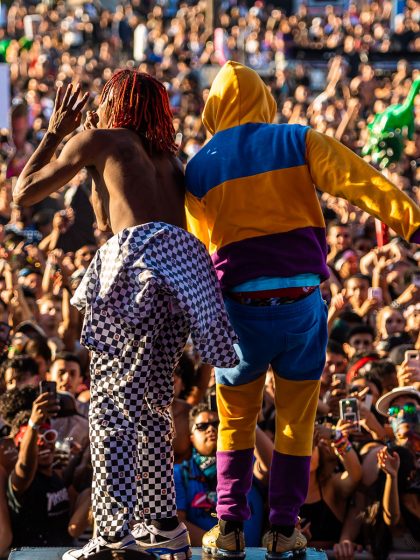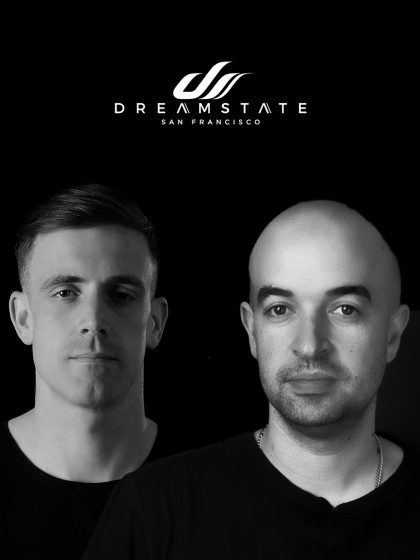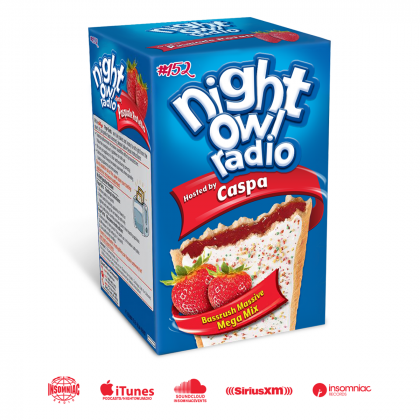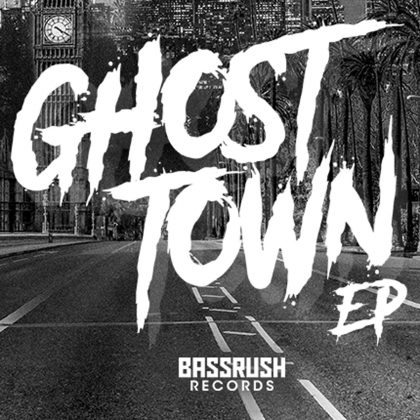Head to Head: Caspa vs. Rusko
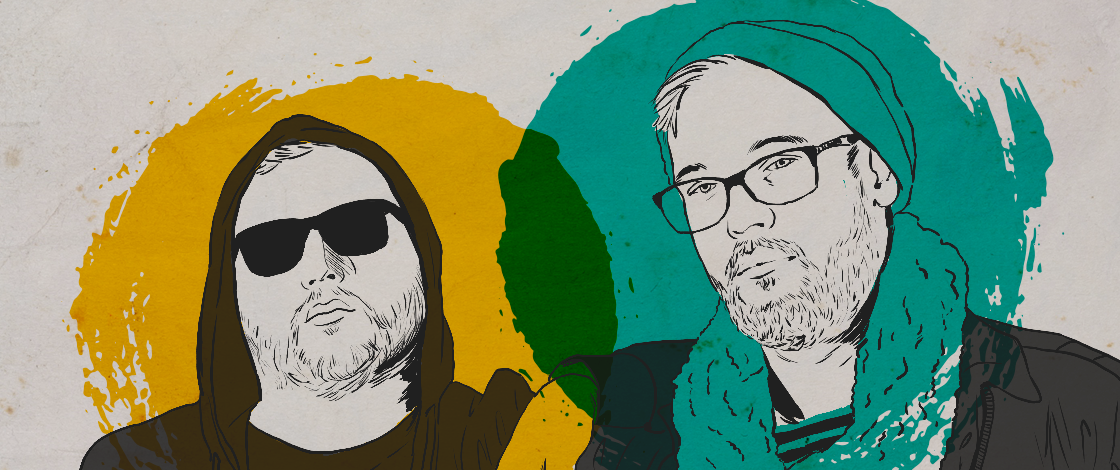
The Head to Head series explores the minds of two genre greats in one in-depth and personal interview together.
With their recently released EP 1 running it red for Sub Soldiers and a highly anticipated performance at Nocturnal Wonderland 2016 only weeks away, the legendary Caspa & Rusko touch down for a special Head to Head conversation, where they reflect on shared memories of the old school and take a glimpse into the ongoing evolution of bass music culture. We can’t help but sit back and marvel at the way the dubstep duo has come full circle in the past year while still promising that the best is still to come.
Was anyone musical in your family growing up?
Caspa: No one was musical or played instruments in my house, but there were a lot of records. My dad is a record collector, and he’s mad into punk and everything from the 1960s to the 1970s. My older brother was a hip-hop scratch DJ who liked Latin, hip-hop, funk, so he had a boss record collection, while my little brother was in bands growing up. As for me, I just always listened to dance music. I remember listening to Brockie and MC DET on Kool FM, and I just found the scene through being a fan and wanting to be involved that way. I know [Rusko’s] side is definitely more musical.

Rusko: Yeah, but only my mom, though. She used to sing and play the mandolin in a British bluegrass/country band, if you can believe there’s such a thing. So, for the first couple of years when I was a baby, she was doing that. While she eventually gave it up, there was always a guitar and mandolin around the house, which I used to play with and record little tapes with when I was a kid. When I got older, I used to play the saxophone, piano and guitar, and I even played in some reggae and ska bands and started recording dub reggae stuff; that’s what led me into making beats, really. I moved from that to a fascination with synthesizers, and as a result, I became a synth freak who barely plays any real instruments but spends crazy money on eBay, buying synthesizers from the 1980s. It’s a good fascination to have, as it means I practice my piano chops sometimes, and I know Caspa is the same as well. I do YouTube and online courses on dance chords and all that kind of stuff. That’s one thing that’s definitely improved on both sides since we’ve first worked together—just music theory, knowing chords and melodies, and stuff like that. There were a few bum notes on some of our old tunes, I tell you.
Caspa:A couple of jazz notes in there for sure. [Both laugh]

At what point did you become aware of dubstep? What about it catches your ear?
Caspa: For me growing up, I just fell in love with jungle. At school, we would record and share tapes off pirate radio shows, which were illegal radio setups in the UK. They would literally just set up [radio] tower blocks in flats and apartments and would transmit their station, and you would pick up and record the music from there. At the time, I listened to all music, but dance music in particular was what I loved the most. When dubstep started coming around off the back of UK garage, it started getting quite dark, and this new sound called dubstep developed. I just fell in love with that sound and found my niche. I found a club night called Forward>> down in London, and I just kept going to that from very early on. At first, there were maybe about 30 people there, and it just grew and grew over the years.
Rusko: For me, growing up in the North of England, I used to go to a lot of reggae/dub sound system events, sound clashes, and stuff like that. This was up in Leeds and Sheffield, and almost always in the main room were two different sound systems going dub for dub at two different ends of a room, while the back room was always jungle. It was in the back room at one of these events that someone played some dubstep. It was a very early set and was mixed with garage and grime. I went home and found Roots FM, and got online and started listening to pirate radio, and just got sucked in from there.
You can still hear all of those influences in your music today.
Caspa: And that’s a really conscious decision of ours. We consciously try to make and put out music that is influenced from our history here in the UK. We grew up listening to dub, reggae, soundclash music, jungle, drum & bass, hardcore, UK garage, and grime. Our music now is a melting pot of all those genres put together in the Caspa & Rusko style.
Those influences seem to carry over to your DJing style as well. Were you conscious of being a DJ or producer first?
Caspa: I was a DJ first. I only started producing because I wanted to get some more bookings. It doesn’t matter if you’re a good DJ. It always comes down to, “Are you making music?” That was the rule early on, and that’s still what it is now. Before, you had real DJs who never really produced; they just DJed. So, I came into it from that angle and started making music later on to get a few more bookings, and everything just started coming through. [Rusko] always played and collected vinyl, but you definitely were coming at it from a producer angle, yeah?
Rusko: Absolutely. I was totally just a producer, and it was getting to the stage in my young life where it was either, get a full-time job or find a way of making money out of sitting in the studio all day. It was almost DJ-by-necessity at that point. Now I love it and couldn’t live without it, but back then, I remember my first gig as Rusko being a totally scary moment. I had to learn to DJ really quick as a way to keep spending time in the studio and making tunes.
When did you guys first become aware of each other? Did you know each other before all this?
Caspa: No, never. I was in London; Rusko was in Leeds. He was making hip-hop under a different alias, and I was DJing on Rinse FM. One day he was like, “Hey man, I’ve got a bunch of tunes I think you’ll love.” He sent them over; I played them on the radio show and was like, “These are fucking sick.” I started giving them out to a few other producers, and everyone was all over it. I was like, “Man, I want to release some of your music on the label.” So, we just started putting out music, and that was it. We didn’t know each other at all; we just connected over very early internet.
Rusko: In those days, it was Instant Messenger, remember? I sent him some tracks, a few demos, and one of them was “SNES Dub,” which became my first release on Dub Police. Within a month of that first single coming out, I moved down to London about five minutes from where Caspa lived, played my first couple of shows, and made the rest of the tunes everybody knows and loves. It was a fast progression, and from there everything moved very quickly, because we were in the right place at the right time doing the right things.
Caspa: That’s how the [FabricLive.37 album] came together—because we were just putting out music, playing shows, playing on radio together. When we got the chance to do the Fabric CD, that’s really where it all began for us; it just took everything to a whole other level.
Rusko: It took us from [being] a UK act to a worldwide act.
It’s been nearly nine years since that album dropped, and now you guys seem to be blowing up once again. How are things different this time around?
Caspa: It’s funny, because after our shows, kids come up to us and they’re like, “Man, when we first heard you guys, we were like 10 or 11 years old, but now we’re 18 and we can come to the show.” For them it’s trippy, because they’ve been listening to us growing up but never had the chance to see us. So, we’ve got a whole new generation of kids telling their friends who we are, and we’ve got the old crew who grew up with us in a different way and the young future crew coming through and checking who we are, thinking we’re new as well. It’s an interesting time.
Rusko: When we linked up last year, it was only for a couple of days, to see if we could make a tune. We just wanted to see if we could still work together and make a track; that was our only goal. That one track led into a whole bunch more, and it spiraled from there. If anything, we were surprised by how natural it still is working together and how our styles, [which] we’ve developed separately as solo artists, play against each other in a nice way. The dark and the light, the yin and the yang, you know?
Caspa: Totally yin and yang. Rusko brings the musical side, and I bring what I do best, which are beats and subs. The combination of both of us together, with the experience and knowledge we’ve gained over the years, is so much fun. I wish we could record it and put it up. It’s such a vibe session.
Rusko: It’s nice, because when we do get together, we’re both ready. As a producer, you’re tinkering every day on bits and pieces and trying stuff out, but when we have studio dates together, it’s planned, focused time, and there hasn’t been a stinker yet, has there?
Caspa: I think more than anything, this time around, rather than saying what we want to do, we know what we don’t want to do; we know what we’re not comfortable with and how we want to be perceived. We’re just having fun; we’re not trying to have a Beatport Top Ten. We’re not trying to do the next crazy music video. We’re not trying to be on mainstage. In fact, we’d rather be on a smaller stage, packing it out and getting the vibe right, because for us it’s all about the music. That’s where it starts, and that’s where it finishes.
Catch Caspa & Rusko at Nocturnal Wonderland on Saturday, September 3, 2016. For more information, visit the official website.
Chris Muniz eats dubstep for breakfast. Follow him on Twitter.
Follow Caspa & Rusko on Facebook | Twitter
Follow Nocturnal Wonderland on Facebook | Twitter | Instagram


